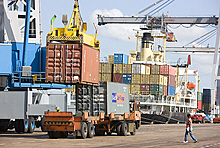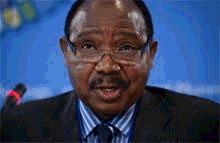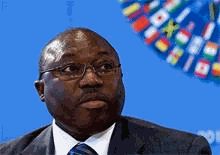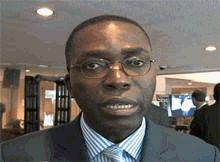
Typical street scene in Santa Ana, El Salvador. (Photo: iStock)
IMF Survey: Africa Faces 'Considerable Risks' From Global Downturn
September 25, 2011
- Shocks for Africa from new downturn could be worse than in last crisis
- Africa has little extra policy space to mitigate further crisis effects
- Authorities weigh steps to cut infrastructure deficit, boost food security
African economies face considerable risks from a renewed global economic downturn, African finance ministers told a Washington news briefing.

Dockside in Dar es Salaam, Tanzania: Africa’s countries now more interconnected than ever with neighbors, export markets (IMF photo)
AFRICAN FINANCE MINISTERS BRIEFING
They added that the continent’s economies are still on the recovery path from the previous global crisis and are in the process of restoring critical economic buffers.
The ministers also stressed that Africa was bracing for adverse effects from the economic problems in the euro zone, with export receipts and remittances particularly vulnerable. They noted that, as a new global downturn threatened, African countries were more interconnected than ever before with their neighbors and with their principal markets.
The ministers’ September 24 briefing, on the sidelines of the 2011 IMF–World Bank Annual Meetings, followed release of the IMF’s latest global economic forecast, which said the world economy is in a dangerous new phase. The forecast said global activity has weakened and become more uneven, confidence has fallen sharply recently, and downside risks are growing. The report noted that emerging markets now face even more volatile capital flows and, along with low-income countries, diverse export conditions.
Tanzanian Finance Minister Mustafa Mkulo said he had noted a growing consensus that a majority of Africa’s trading and development partners—the advanced economies—would most likely experience a second round of severe economic downturn. “Our economies are interconnected as never before in many ways, from trade to financial flows,” Mkulo stated. “In that regard, the risks to the African economies, and especially the East African economies, are considerable.”
Strong policies
Mkulo recalled that three years ago Africa had been hit hard by the global economic crisis as export demand fell and financial flows declined. “Our collective and bilateral response helped to shield our economies from the deeper downturns. Our strong policy frameworks were supported by fiscal and foreign reserves buffers. As a result, our countercyclical policy responses helped to swiftly reverse the adverse trends.”

Tanzania’s Mkulo: ‘Our economies are interconnected as never before in many ways, from trade to financial flows’ (IMF photo)
Economic shocks from the euro area crisis and from problems in other advanced economies could be stronger and possibly more severe than during the last crisis, Mkulo said. “Our economies are still on the recovery path and in the process of restoring critical economic buffers. There is real danger that the modest progress we have attained in meeting some of the Millennium Development Goals will be eroded by an ensuing global economic crisis.”
The Gambia’s Finance Minister, Mambury Njie, observed that a decade of sound policies had enabled African countries to withstand the global economic crisis of 2008–09. However, recent developments in the global economy posed downside risks to sub-Saharan Africa, particularly through heightened pressures on the balance of payments, reduced export demand, and declining government revenue.
“The risks are even greater this time around as we have already used up large parts of our macroeconomic policy buffers, specifically fiscal space and external reserves, to mitigate the impact of the crisis,” Njie said.
Lower export earnings
Finance Minister Cristiana Duarte said Cape Verde had felt the impact of the global crisis in its external accounts, mainly from lower export earnings and falling remittances. She said 90 percent of Cape Verde’s exports went to Italy, Portugal, and Spain, leaving the African island nation particularly vulnerable to the crisis in the euro zone. “We are an open economy, so the international crisis is hard on Cape Verde,” she said.

The Gambia’s Njie: ‘The risks are even greater this time around as we have already used up large parts of our macroeconomic policy buffers’ (IMF photo)
The Cape Verde authorities’ response had been to support demand by promoting public investment, Duarte said. Deficit and debt levels had risen but within sustainable limits. The government had resolved to access only concessional financing and to avoid tapping commercial markets.
Democratic Republic of Congo Finance Minister Ponyo Mapon Matata said the extended global crisis was having a growing adverse effect on developing countries. The Congolese government was striving to contain its fiscal balance within the limits of macroeconomic stability. “Despite the difficult macroeconomic situation, we are trying, with prudent policies, to improve basic infrastructure and the education and health sectors.”
The ministers called for prompt action by advanced countries to address the growing threat of a new global downturn.
“Now more than ever, political institutions in the advanced economies need to rise to the current economic challenges to take the urgent action necessary to address weaknesses in bank and household balance sheets in order to restore confidence and prevent a global recession,” Njie said.

Cape Verde’s Duarte on global slowdown effects: ‘We are an open economy, so the international crisis is hard on Cape Verde’ (IMF photo)
Njie also said that, in view of African countries’ limited policy space, “the international community must stand ready to provide additional concessional financing and policy advice to the innocent bystanders impacted by the crisis.”
Infrastructure deficit
The ministers also proposed additional policy action to mitigate the impact of a continued global economic downturn, focusing on addressing Africa’s infrastructure deficit and improving its food security.
Matata told the briefing that Africa’s infrastructure problems were aggravating the impact of higher food prices. He said the solution to higher food costs lay in boosting Africa’s domestic food production and easing supply constraints on agricultural products throughout the continent. Construction of better roads to carry farm production to markets was an essential first step in this direction.
Njie said the Gambia planned to scale up resources for infrastructure investment in the farm sector. “We are putting agriculture and food security first. These are priority areas given the recent increases in food prices.”

Democratic Republic of Congo’s Matata: ‘Instead of each state looking for special solutions for its economy, we should have joint projects’ (photo: World Bank)
Njie described a national agricultural investment program that had been launched to boost agriculture’s contribution to GDP while also ensuring food security through targeting investment in land preparation and supply of agricultural inputs. Budget allocations to the Gambia’s agricultural sector had been doubled and would continue to be increased.
Matata said Africa’s most serious infrastructure problem was its energy supply deficit. “No industrial development can be accomplished without an energy supply that is reliable and sufficient.”
Regional integration
Regional integration—examples include groupings such as the East African Community, the Economic Community of West African States, and the Southern African Development Community—could be the solution to Africa’s infrastructure deficit, Matata said. African countries should mobilize their development partners to support projects that encouraged such integration, he added. “Instead of each state looking for special solutions for its economy, we should have joint projects that generate electricity and could supply the entire subregion and beyond.”
Mkulo said energy was a problem for Tanzania, which experienced frequent power outages. “If we improve energy, we shall improve production. If we improve production, we shall improve employment. And if we improve employment, we shall create more economic growth,” Mkulo said.
Mkulo suggested that if the international community could invest in Tanzania’s power sector, the situation could be eased. He added that Tanzania was opening up its energy production to private sector participation.







